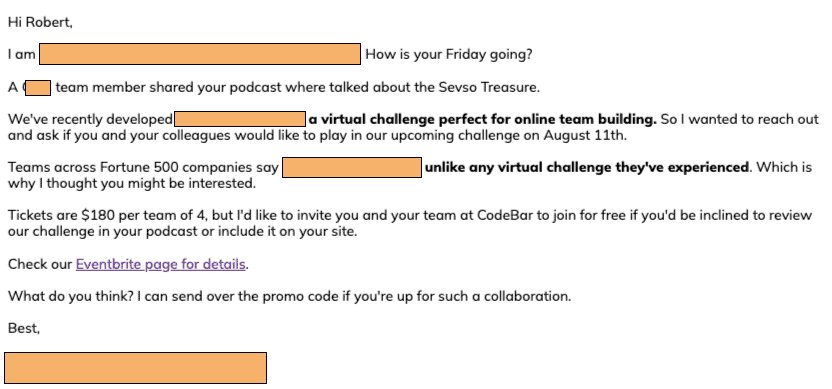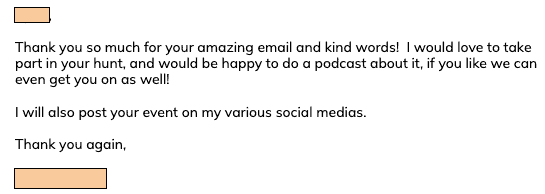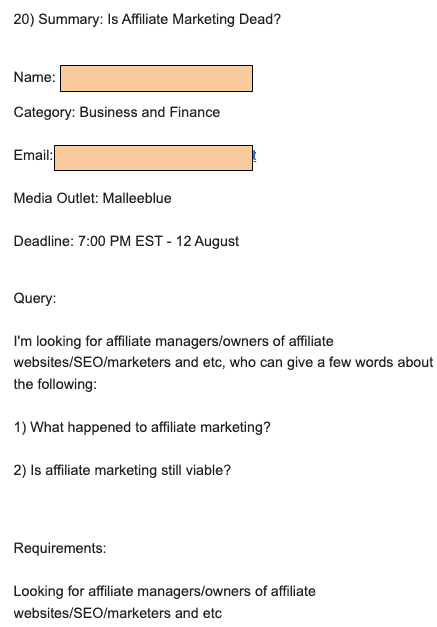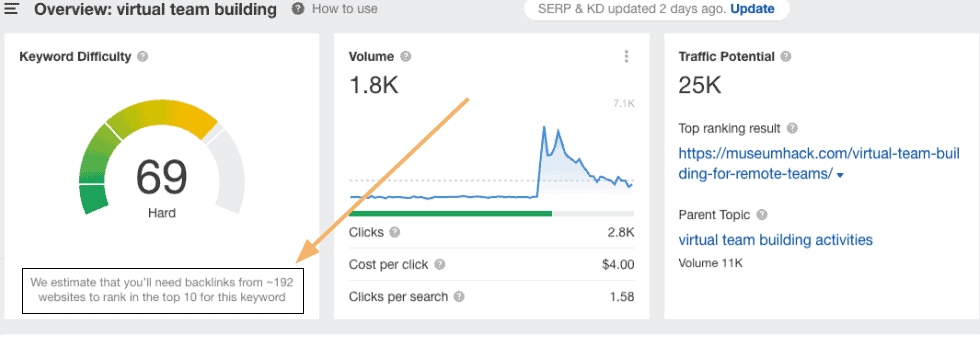We usually compare google to a popularity contest, with millions of sites competing with dozens of factors to gain top rankings. Backlinks provide a “confidence vote,” which indicates the importance of Google for search results. Many businesses and marketers who understand search engine marketing know how important link building is.
So, are backlinks good for ranking? What does SEO mean for backlink traffic on the web?
But first thing first.
Table of Contents
ToggleWhat is a backlink?
A backlink is a link that connects one website to another. If someone links to your site, then you have a backlink from that site. If you link to another site, then they have a backlink from you. Backlinks are also called inbound links (IBL) or incoming links.
Search engines like Google use backlinks as a way to measure the popularity and importance of a website. When one site links to another, it’s a vote of confidence. The more votes (or backlinks) a site has, the more popular it is, and the higher it will rank in search engine results pages (SERPs).
Types of Backlinks
Not all incoming links perform the same function. There are three different types of backlinks that you’ll need to be aware of:
Dofollow backlinks: These are the most common type of backlink and pass along link equity (also known as “link juice”). Link equity is a ranking factor that helps determine how well a website will perform for search engine results pages.
Nofollow backlinks: These backlinks don’t pass along any link equity. They’re typically used when linking to untrusted or unknown sources. Nofollow links were introduced in 2005 as a way to stop comment spam. Nowadays, it’s used to tell Google not to count a link as a vote.
Reciprocal backlinks: These are links that are exchanged between two websites. In other words, website A links to website B and vice versa. Reciprocal backlinks are not as common as they once were, but they’re still considered a valuable resource.
Why are backlinks good for search engine optimization?
Backlinks are very important because Google ranks them as one of the key search factors. The algorithms used by Google determine if it ranks the site for a particular keyword. Backlink profiles are based on a website’s link size and quality. In general, sites that have more links have higher Google search results. The link to a webpage is highly correlated with search traffic.
In short, backlinks help build domain authority immediately. The number of backlinks to a site is a good indicator of its popularity or importance. Google uses this information when determining where to rank web pages in search engines.
How important is backlinking for SEO?
The importance of backlinks has been well-documented. Google has clarified that backlinks are one of its top three ranking factors.
A study by Moz showed a strong correlation between the number of backlinks and a website’s position in Google search results. The higher the number of backlinks, the higher the position.
Here is what the study looks like:
Three points are important to note:
1. The study found a strong correlation between the number of links to the ranking page.
2. Then comes the Domain Authority of the linking domain, followed by
3. The PA of the ranking page.
Also Read: HARO Link Building: How To Grow Domain Authority
How many backlinks do you need to rank for SEO?
This is a difficult question to answer, as there is no “perfect” number of backlinks. It depends on the quality of the backlinks, as well as the number of other ranking factors that are in play.
It also depends on the difficulty level of the keyword you are trying to rank for. If you’re trying to rank for a highly competitive keyword, then you’ll need more backlinks than if you’re trying to rank for a less competitive keyword. So, ultimately, it depends on the keyword research that you do before starting your link-building campaigns.
Read our guide on how to check google ranking.
Let’s say you’re trying to rank for the keyword “coffee.” You’re at a disadvantage if you have 100 backlinks and your competitor has 1,000. But if you have 100 backlinks and your competitor has 90, then you’re in a good position.
Apart from just getting website links, it also depends on the quality of domains linking to your site. If you have 100 backlinks from low-quality websites and your competitor has 25 high-authority backlinks, then they’re going to rank higher than you.
In general, it’s better to have fewer high-authority backlinks than to have many low-quality backlinks.
But how would you know if a backlink is of good quality? Which links helped your competitors increase their search engine accessibility? How would you know which backlinks your competitor has secured? How can you get high-quality backlinks from the same authority sites and improve your search visibility?
The answer is, you don’t. Not unless you use a tool like Ahrefs, SEMrush, or Moz to conduct competitive backlink research.
All these tools are good at analyzing backlinks and keywords. They’ll give you an accurate picture of where you stand and what you need to do to improve your rankings.
If you’re serious about SEO, you must invest in one tool. They’ll save you time and effort and help you rank higher in Google search results.
Can you rank in Google without backlinks?
A difficult question to answer. In theory, yes, you can rank in Google without any backlinks.
Let me explain how.
It’s possible to get page 1 rankings without generating backlinks. You’ll find it hard to get rankings outside keywords and categories with low competition. Using long-term keywords makes ranking in low competition areas possible.
And if you can find these keywords that are on the brink of gaining in popularity, you might very well get organic backlinks. But don’t certainly count it!
Example: how to rank without backlinks
Suppose you have a website about coffee. And instead of optimizing your content for “coffee,” which is a high-competition keyword, you optimize it for a less competitive keyword like “best coffee shop in ______.”
Let’s say you live in a small town with only a few coffee shops. If you optimize your website for “best coffee shop in ______,” you have a good chance of ranking in Google, even without any backlinks.

Remember, if the competition and difficulty are low, you may rank for that. But it also means the keyword will not produce a lot of traffic as not many searches take place every month.
Instead of ranking only for long-tail keywords with low competition and low traffic, it’s advised to put effort, time, and money into ranking for keywords with more search volume, as long as you have a chance of competing for them.
What makes a good backlink?
There are a few factors that make a backlink suitable. As you might have guessed, not all backlinks are made equal.
1) The Domain Authority of the website linking to your site:
The authority of a website is measured by its Domain Authority (DA). The higher the DA of a website, the more authoritative it is. And the more authoritative a website is, its links are more valuable.
2) Topical relevancy of the blog post and the website linking to your site:
If the blog post linking to your site is about coffee, and your site is about coffee, then that’s a relevant backlink. But if the blog post is about cats and your site is about coffee, that’s not a relevant backlink. No matter how many links you have from relevant websites, those links will not be as valuable if they’re not linking to relevant pages on your website.
3) Anchor Text linking to your blog
Anchor text is an essential component because it’s one of the factors that Google looks at when determining the relevance of a contextual backlink. If you can include relevant anchor text in your backlinks, it will help you rank higher in search results.
More good and diverse backlinks = better results
When looking at a website’s backlink profile, Google considers how many other websites are linking. The more links a website or blog article has from high-quality websites, the more likely it is that Google will trust it and rank it higher in its search results.
Of course, as long as they are not coming from spammy websites. You still need a quality blog article optimized for keywords and technical performance.
How to find backlinks in 2022
If you want to find backlinks in 2022 and the backlinks that will boost your ranking in search engines, the following are some white hat methods that you can use:
Before we move forward, let me explain what white and black hat SEO are. Black hat SEO is a practice that goes against Google’s guidelines, while white hat SEO adheres to Google’s guidelines. Blackhat practices include spamming links
We will be focusing on white hat SEO methods to find backlinks in 2022.
1) Outreach to request for backlinks:
Outreach is the process of reaching out to websites and bloggers in your niche, asking them to link to your website.
The key to a successful outreach campaign is finding websites relevant to your niche with high domain authority. You can use a tool like Moz’s Open Site Explorer to find websites that have high DA.
Once you’ve found relevant websites, you need to contact the site owner and ask them to link to your website. It’s best to offer to contribute a guest blog, podcast interview, or even invite them to your event. The best way to do this is by emailing them.
When you’re emailing website owners, make sure to personalize your emails. Generic emails are more likely to be ignored.
Check this example of email outreach we did for a client:

And here is what they wrote back:


So the podcast and website owners are not only thanking us for our email but also sharing our information on their social media. Now we can develop this relationship to our mutual benefit. This is how you can use outreach to get high-quality backlinks in 2022.
2) Guest Blogging:
Guest blogging is when you write a blog post for another website in your industry, and typically in return, you are allowed to include a do-follow link to your website.
This is a fantastic way to get great backlinks because you can write for an authoritative website in your industry.
To find guest blogging opportunities, you can use both Google search or a tool like Ahrefs or Moz. For Google, use search operators like “intitle:” and “inurl:” to find guest blogging opportunities.
For example, if you’re in the fitness industry, you can search for “intitle:write for us fitness” or “inurl:write-for-us/fitness.”
This should give you a list of websites looking for guest bloggers in the fitness industry. Next up, find the contact information for the content manager or blogger. Write them a great email about contributing to their blog, specifically for a keyword they are not yet ranking for.
3) HARO:
HARO (Help A Reporter Out) is a service that connects journalists with sources for their articles.
You can get a link to your website if you’re quoted in an article.
To find opportunities, sign up for HARO and choose the industries and topics you’re interested in.
You’ll then start receiving daily emails with opportunities that match your criteria.
Once you find a good opportunity, pitch the journalist and explain why you’re the best person for the job.
Here is what a query at HARO looks like:


Once you pitch them and a journalist picks you as a source, they typically provide a backlink to the website you’ve provided. This is a great way to build backlinks from authoritative sites without writing blog content.:
4) Infographics:
Infographics are a great way to get backlinks because people love visual content.
You can then reach out to other bloggers and websites in your industry and offer them the opportunity to share your infographic with their readers. If you create a good infographic, many bloggers will happily share it with their readers.
Some also suggest promoting your infographic by submitting it to infographic directories.
A quick Google search for “infographic directories” will give you a list of websites where you can submit your infographic.
This way, you can get high-quality backlinks and traffic to your website, and marketers will use your infographic on their blog posts, which will help you get even more backlinks.
5) Find broken backlinks
Offering your blog as a replacement for a broken backlink can be used as a backlink-building strategy. This is because you will be providing value to the website hosting the broken link and, in doing so, you may be able to get them to add a link to your blog as well.
To find broken links on other websites, you can use tools such as Google Search Console, Ahrefs, or MozBar. Once you have identified a broken link, reach out to the webmaster of the website and offer your blog as a replacement.
How to find robust and relevant backlink opportunities?
There are four steps to finding backlink opportunities:
Use Ahrefs to find relevant websites that already link to similar content:
The first step is to find relevant backlink opportunities with Ahrefs. You can do this by entering a competitor’s website into the Ahrefs Site Explorer and looking at their backlinks. Ahrefs will show you the number of backlinks a website has and the referring domains. You can use this data to find websites with a high number of backlinks and are in your industry.
Once you’ve found a few relevant backlink opportunities, you can reach out to the website owners and ask for a link or offer to contribute a guest post. Tools like Respona and BuzzStream are perfect for this type of backlink outreach.
How do you get strong backlinks?
Link-building strategies work best when you provide substantial value. The better your website and guest blog posts are, the more likely your backlink outreach will be effective.
Your website should be informative, well-designed, and user-friendly. Your guest blog posts should be well-written and informative. You’ll likely get a backlink if you can provide value and solve a problem.
Let’s say you have a website about dog training. You could write a guest blog post for a pet website that covers the topic of “How to potty train your puppy.” But make sure it’s better than the top 5 results on Google.
FAQs about Backlinks
Are backlinks still important for SEO in 2022?
Yes! Backlinks are still an important ranking factor for SEO in 2022. In fact, witnessing the competition in every niche, it has become even more essential to have backlinks from high-quality websites.
Is link building still effective?
Yes, link building is still effective because it’s an important ranking factor for SEO. Link building can be time-consuming, but it’s worth it if you want to improve your SEO.
How many backlinks does my site have?
You can use a tool like Ahrefs to check the number of backlinks your site has. Make sure to check the referring domains as well, so you can see how many unique websites are linking to your site.
How do you find out how many backlinks you need?
The number of backlinks you need varies depending on your niche and the competition in your niche. If you’re in a competitive industry, you’ll need more backlinks than in a less competitive industry.
Why is earning backlinks important for businesses?
Backlinks are important for businesses because they help improve SEO. Backlinks signal to Google that your website is popular and trustworthy, which can help your website rank higher in search results.
Why are backlinks important for writers?
If you’re a writer, backlinks can help you get more organic and referral traffic to your website and improve your SEO. With a higher domain authority, other sites will be more likely to link to your site and want to work with you.
How many backlinks per day is safe?
There’s no magic number of backlinks per day; that’s safe. It depends on the quality of the backlinks and the number of referring domains. 20 to 25 links from high-quality websites would be a good goal. For the particular blog you’re working for, check Ahref’s Keyword Explorer to see how many backlinks they recommend.


Where can I get high-quality backlinks?
HARO, guest blogging, and outreach are the most vital ways to get strong backlinks.
How do you create a high-quality link?
A high-quality link is a link from a relevant website in your industry with high domain authority.
Which is the most powerful backlink?
Any link from a website with a high domain authority relevant to your industry is a powerful backlink.
How do SEO backlinks work?
Backlinks work by linking to your website from other websites. This signals to Google that your website is popular and trustworthy, which can help improve your ranking in search results.
How can I get valuable backlinks?
Reach out to websites in your industry and offer to guest blog, or use HARO or outreach to get backlinks.
What does a good backlink profile look like?
A good backlink profile looks like a mix of links from high-domain authority websites in relevant industries with various anchor texts.
Why are backlinks important in off-page SEO?
Off-page SEO is all about building relationships and getting links from other websites. Backlinks are important because they’re one of the most ranking factors for SEO. The more backlinks you have from various relevant sites, your domain and page authority will be better.
Conclusion
There you go! Now you know why backlinks are so important and how they can help improve your SEO. If you want to get more traffic to your website, start guest blogging, using HARO, or reaching out to other websites in your industry. The more relevant backlinks you have, the better your SEO will be.
You can reach out if you want me to help you get high-quality, relevant backlinks for your website. I can help you build your SEO and keyword strategy to build the traffic and SEO results you’re looking for. I specialize in link building and have a team of experts who can help you write content for your site and guest blogs to get the backlinks you need to improve your organic search traffic.



